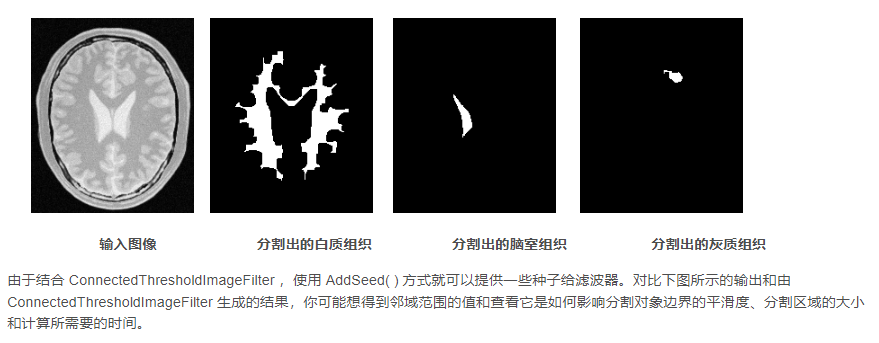1 #include "itkNeighborhoodConnectedImageFilter.h"
2 #include "itkImage.h"
3 #include "itkCastImageFilter.h"
4 //使用 itk::CurvatureFlowImageFilter 在保护边缘时平滑图像
5 #include "itkCurvatureFlowImageFilter.h"
6 #include "itkImageFileReader.h"
7 #include "itkImageFileWriter.h"
8
9 int main( int argc, char *argv[] )
10 {
11
12 /*if( argc < 7 )
13 {
14 std::cerr << "Missing Parameters." << std::endl;
15 std::cerr << "Usage: " << argv[0]
16 << " inputImage outputImage"
17 << " seedX seedY"
18 << " lowerThreshold upperThreshold" << std::endl;
19 return EXIT_FAILURE;
20 }*/
21
22 /*现在我们使用一个特殊的像素类型和图像维来定义图像的类型。由于平滑滤波器的需
23 要,这种情况下对像素使用浮点型数据类型*/
24 typedef float InternalPixelType;
25 const unsigned int Dimension = 2;
26 typedef itk::Image< InternalPixelType, Dimension > InternalImageType;
27 //使用图像类型作为一个模板参数来对平滑滤波器类型进行实例化
28 typedef unsigned char OutputPixelType;
29 typedef itk::Image< OutputPixelType, Dimension > OutputImageType;
30
31 typedef itk::CastImageFilter< InternalImageType, OutputImageType >
32 CastingFilterType;
33 CastingFilterType::Pointer caster = CastingFilterType::New();
34
35 typedef itk::ImageFileReader< InternalImageType > ReaderType;
36 typedef itk::ImageFileWriter< OutputImageType > WriterType;
37
38 ReaderType::Pointer reader = ReaderType::New();
39 WriterType::Pointer writer = WriterType::New();
40
41 reader->SetFileName( "BrainProtonDensitySlice.png" );
42 writer->SetFileName( "Neighborhood_huizhi2.png");
43
44 typedef itk::CurvatureFlowImageFilter<InternalImageType, InternalImageType>
45 CurvatureFlowImageFilterType;
46 //调用 New( ) 方式来定义滤波器并将结果指向一个 itk::SmartPointer
47 CurvatureFlowImageFilterType::Pointer smoothing =
48 CurvatureFlowImageFilterType::New();
49 //现在我们声明区域生长滤波器的类型。这种情况下是 NeighborhoodConnectedImageFilter
50 typedef itk::NeighborhoodConnectedImageFilter<InternalImageType,
51 InternalImageType > ConnectedFilterType;
52 //使用 New( ) 方式对这个类的一个文件进行结构化
53 ConnectedFilterType::Pointer neighborhoodConnected
54 = ConnectedFilterType::New();
55 /*现在到了连接一个简单的线性管道的时候。在管道的开头添加一个 reader 文件并在末尾
56 添加一个 cast filter 和 writer 。由于只有仅仅一小部分图像文件格式支持浮点型数据类型,
57 所以使用 cast filter 将浮点型数据类型转换成整型*/
58 smoothing->SetInput( reader->GetOutput() );
59 neighborhoodConnected->SetInput( smoothing->GetOutput() );
60 caster->SetInput( neighborhoodConnected->GetOutput() );
61 writer->SetInput( caster->GetOutput() );
62 //滤波
63 /*CurvatureFlowImageFilter 需要定义两个参数。下面是一个二维图像的常见值。当然它们
64 也需要根据输入图像存在的噪声的数量进行适当的调整*/
65 smoothing->SetNumberOfIterations( 5 );
66 smoothing->SetTimeStep( 0.125 );
67
68 const InternalPixelType lowerThreshold = atof( "180" );
69 const InternalPixelType upperThreshold = atof( "210" );
70 /*NeighborhoodConnectedImageFilter 有两个主要的参数需要设定,它们分别是为了确定是
71 否包含在区域中的亮度值而制定的标准的上门限和下门限。这两个值设定得太接近势必会降
72 低区域生长的机动性,而设定得太远必将整个图像都卷入区域中*/
73 neighborhoodConnected->SetLower( lowerThreshold );
74 neighborhoodConnected->SetUpper( upperThreshold );
75 /*这里我们增加定义邻域大小的一个至关重要的参数,用来决定一个像素是否在这个区域
76 中。邻域越大,这个滤波器在输入图像中滤掉噪声的稳定性就越强,但是计算需要的时间也
77 将更长。这里我们选择每个维上两个长度r(2r+1)的一个滤波器,这将产生一个 5×5 像素的邻域*/
78 InternalImageType::SizeType radius;
79
80 radius[0] = 2; // two pixels along X
81 radius[1] = 2; // two pixels along Y
82
83 neighborhoodConnected->SetRadius( radius );
84 /*由于在 ConnectedThresholdImageFilter 中,现在我们就必须提供在区域中能被输出像素所
85 接受的亮度值而且至少是一个种子点来定义最初的区域*/
86 InternalImageType::IndexType index;
87
88 index[0] = atoi( "107" );
89 index[1] = atoi( "69");
90
91 neighborhoodConnected->SetSeed( index );
92 neighborhoodConnected->SetReplaceValue( 255 );
93 /*Writer 上的 Updata() 方法引发了管道的运行。通常在出现错误和抛出异议时, 从一个
94 try / catch 模块调用 updata*/
95 try
96 {
97 writer->Update();
98 }
99 catch( itk::ExceptionObject & excep )
100 {
101 std::cerr << "Exception caught !" << std::endl;
102 std::cerr << excep << std::endl;
103 }
104 return EXIT_SUCCESS;
105 }



